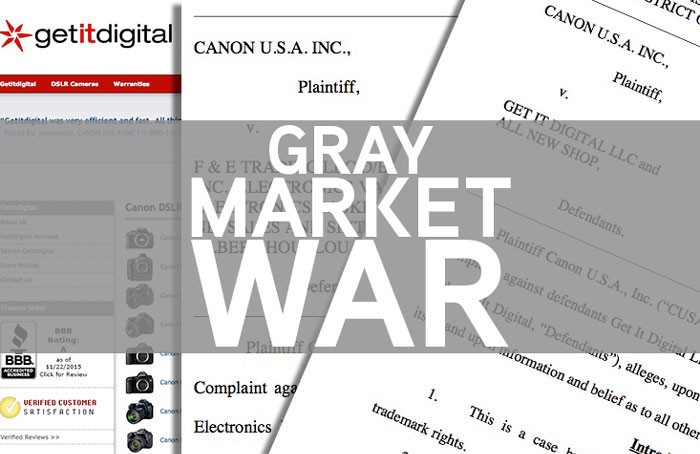
It’s been quite some time since I reported an update in Canon USA’s attack on gray market retailers. A few things have happened since then, including the dismissal of Canon’s case against the ebay seller Get It Digital.
If you aren’t up to speed on the Canon USA v. Gray Market Retailer cases, check out the primer here, which includes a list of links to all the subsequent updates.
Now, before we all get too happy about Canon’s case against “Get It Digital” being dismissed and the free-flow of cheaper gray market cameras in the US, let’s read between the lines for a better idea of what really happened.
Back in February, I reported on an old case between Olympus and F & E Trading, LLC.
The alleged facts against F & E Trading were much milder than what Canon alleges in the current lawsuit. The crux of Olympus’ case centered around simply importing cameras from Asia for sale in the US, which allegedly violated trademark law. The legitimacy of such legal conclusions in Olympus’ lawsuit are somewhat questionable; however, those claims were not challenged.
In the Olympus lawsuit, F & E Trading never filed a response and settled out of court.
This case and its settlement agreement, I think, inform us quite a bit about the nature of the Get It Digital case and settlement.
Generally, the terms of these settlement agreements are not a part of the court record or otherwise made available to the public. However, I was able to obtain a copy of the Olympus and F & E Trading settlement agreement to give us a peek behind the curtain of just how devastating the terms were to F & E’s business as a gray market importer of Olympus cameras.
As I previously noted, these were essentially the same goals Canon USA has in the lawsuits against both Get It Digital and F & E Trading. Now, it looks like Canon has reached similar terms with Get It Digital, LLC, which is the stipulation that has led to the dismissal of the lawsuit.
We left off earlier this year with Canon and Get It Digital in the early parts of the discovery phase, which can get very expensive for both parties. Obviously, Canon has much deeper pockets than Get It Digital, which may or may not have played into the decision. Both parties entered a stipulation of dismissal “with prejudice” in late May. The court entered an order dismissing the case on June 1, 2016.
The dismissal “with prejudice” is the red herring that there was a settlement agreement between the two parties. Otherwise, Canon would have simply dismissed the case without prejudice – meaning that it could re-open the case at a later date for any given reason. Get It Digital wanted the case closed without the option for Canon to re-file and that would have been part of the terms of the settlement. As long as Get It Digital lives up to end of the settlement agreement (i.e., stops selling gray market cameras), Canon won’t sue it again.
Additional evidence that the case has settled on Canon’s terms is the fact that Get It Digital and its related companies no longer offer Canon cameras for sale in their ebay stores. I suspect that the terms of the settlement agreement between Get It Digital and Canon USA largely mirror the terms we saw in the Olympus settlement agreement.
For the sake of context, I’ll repeat the key terms from the Olympus settlement agreement here (consider “F&E” as interchangeable with “Get It Digital” and “Olympus” as interchangeable with “Canon”):
- F&E agrees not to sell, advertise, purchase, import, ship, or in any way trade in Olympus products.
- F&E is given about one month to sell off current stock of Olympus products.
- F&E agrees not to disseminate or publish false or deceptive statements about Olympus or its products.
- F&E agrees to pay an unknown amount of money to Olympus.
- F&E agrees to provide Olympus with all sources and contact info of sources that relate to its purchase of Olympus products over the previous two years.
- F&E agrees to provide a list of Olympus inventory, along with serial numbers for E-M1, E-M10 and Stylus 1 cameras.
- F&E agrees to provide a list of any and all affiliates related to F&E.
- The settlement agreement is binding on F&E’s principals, trustees, directors, officers, employees, parent companies and affiliates.
- Strict confidentiality of the terms of the settlement agreement by both F&E and Olympus.
What About Canon v. F & E Trading?
Canon’s lawsuit against the F & E Trading is still ongoing, the parties are locked in a duel of motions to dismiss and counterclaims with no real progress since then. When something significant happens with this case, I’ll update the story. With fourth quarter underway now, I doubt that F & E Trading has any desire to settle since it will likely sell a ton of discounted gray market cameras over the next couple months or so.


The problem with gray-market merchandise is that it rarely has a warranty that will be honored in the US.
Many years ago, when I was building up my Olympus OM system, I bought lenses and a motor drive from an Asian dealer. I took the chance that nothing would break down, and nothing did. I would never buy a gray-market camera body or flash. It’s not worth the risk.
In 14 years I have only had one Canon failure, an IS problem with a non-L lens. I took the chance and purchased a 100-400mm II and a 5DsR from Get it Digital. Both items registered with Canon on line OK. I saved $900 and the one year warranty is almost up in any case. The sales person was very pleasant to deal with on the phone.
In its lawsuit against Get It Digital, Fujifilm reportedly claims gray market cameras might not be up to the same standards as those imported and sold through Fujifilm channels. Same standards presumably refers to quality of parts, assembly and performance — plus a nebulous implication gray market camera might be less than safe in use.
IMO, that begs the question, in what country or region of the world does Fujifilm (or any other camera manufacturer) choose to risk its reputation by selling substandard, even potentially unsafe, products bearing its brand name? I strongly suspect the honest answer is none, for obvious reasons.
Rather than engage in a kind of buyer-beware scaremongering that fails the commonsense test, camera manufacturers would do better to level with consumers. As in, “OK, gray market cameras made by us are no more likely to be or become faulty than those sold through our distribution channels. We charge American consumers a bit more to be able to stand behind our products more in keeping with their expectations. Also, we pay more for a given amount of marketing and advertising in the U.S. than elsewhere. If you want the lowest possible price and are willing to be on your own to get a faulty camera made by us fixed, or to ship it internationally for warranty repairs or replacement by what could turn out to be a fly-by-night seller or underqualified repair person, so be it. We urge you to think carefully about whether a few dollars saved is really worth the added risk of disappointment and possible additional trouble and expense should anything go wrong.”
I think what they were trying to say is that the imported items didn’t go through the usual testing before importing that all electronics must go through to prove they comply with safety and interference requirements which may be different for every market.
The items may have been tested for compliance for sale in Asian markets but not N. American market, selling these items that have not gone through compliance testing in this market is illegal.
An example of compliance testing is to ensure the product doesn’t cause interference in other products.
” . . . selling these items that have not gone through compliance testing in this market is illegal.”
That’s an interesting possibility, but I tend to doubt it applies. If I was in charge of camera production for one of the manufacturers, setting up a factory run of a jillion $500 cameras, I would want all products to meet requirements everywhere if at all possible. A single, standardized, rapid production run is most efficient and in the long run, least costly. And, if repair, servicing or, worst of all, a recall, is needed later on, the fix can be simpler, less time consuming and costly, too. No need for this and that component for one market, other components or even other adjustments, for another market. I suppose there might be some situation where requirements are in such great conflict in two regional markets that complete standardization wouldn’t be possible. I tend to doubt that also. Mass-market manufacturing tends strongly toward standardization.
Oh, I meant to add about illegality: All legal actions against gray market camera (and related gear) I’ve heard of over the years have been initiated by manufacturers or licensed U.S. marketing and distribution companies, not government watchdogs.
Yes, many companies (in many industries) overplay the “dangers of gray market” message. It’s weasel-y and unnecessary.
That said, no company’s lawyer would let them make an affirmative claim like “OK, gray market cameras made by us are no more likely to be or become faulty than those sold through our distribution channels.” The company — let’s say it’s Canon — cannot know whether that is really true, since they have no control or influence over the entities involved in the gray market supply chain. In the authorized distribution chain, they have contracts with every entity involved, contracts that include provisions that prevent the retailers or sub-distributors from altering the products, included accessories, or packaging etc. In other words, they have contractural safeguards in place that protect themselves, of course, but which also serve as (weak) consumer protections. Canon can attest to those safeguards. With gray market, by definition, those contracts don’t exist, and so Canon cannot safely make any statements about what you will receive if you buy a gray market product.
And that may be important for a reason that often gets overlooked in internet discussions where famous, often large and rich brands are easy targets for criticism. That reason is this: some gray market importers and retailers are entirely reputable (B&H Photo, for example), but plenty of them are thieves. It’s no different than any other field of human endeavor. So, yes, the big camera companies can and do behave badly — but lots of small businesses do, too. There are no saints in these battles — they are all, from famous brands to no-name importers, just trying to make a buck and your well-being is not their first priority.